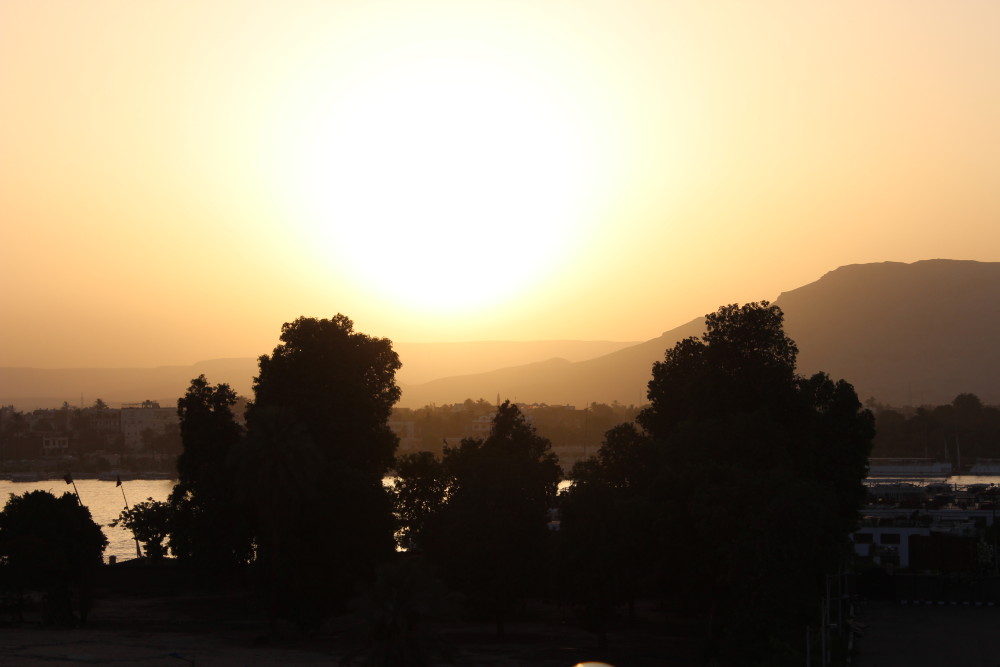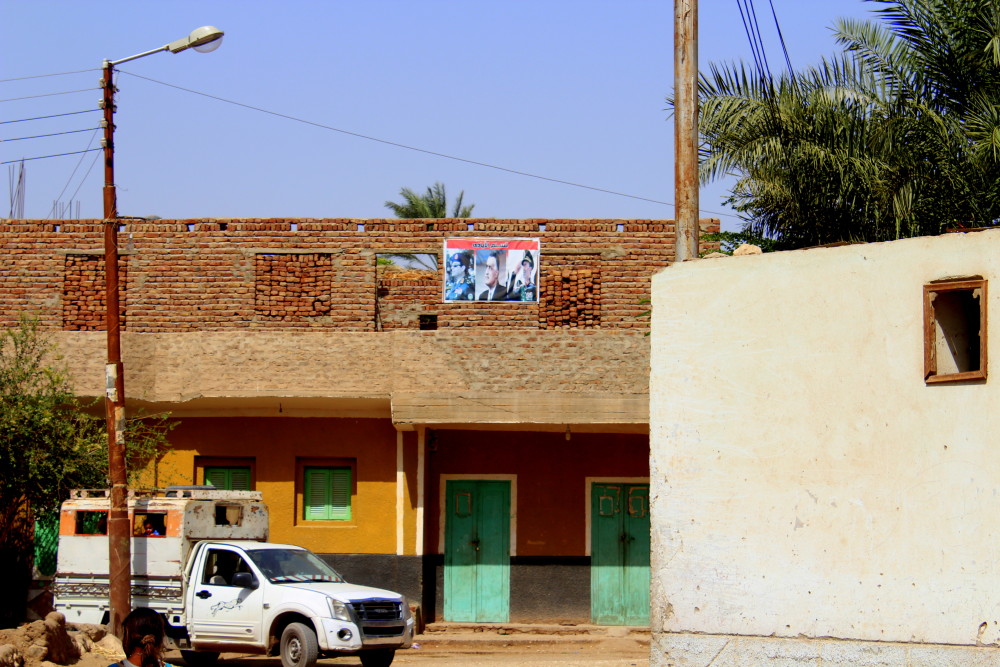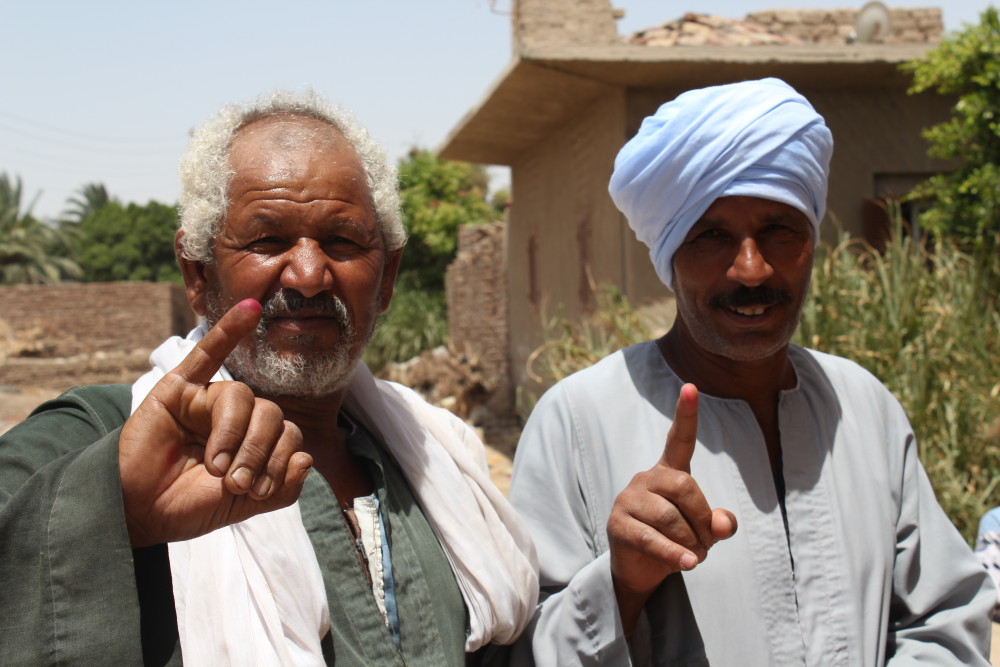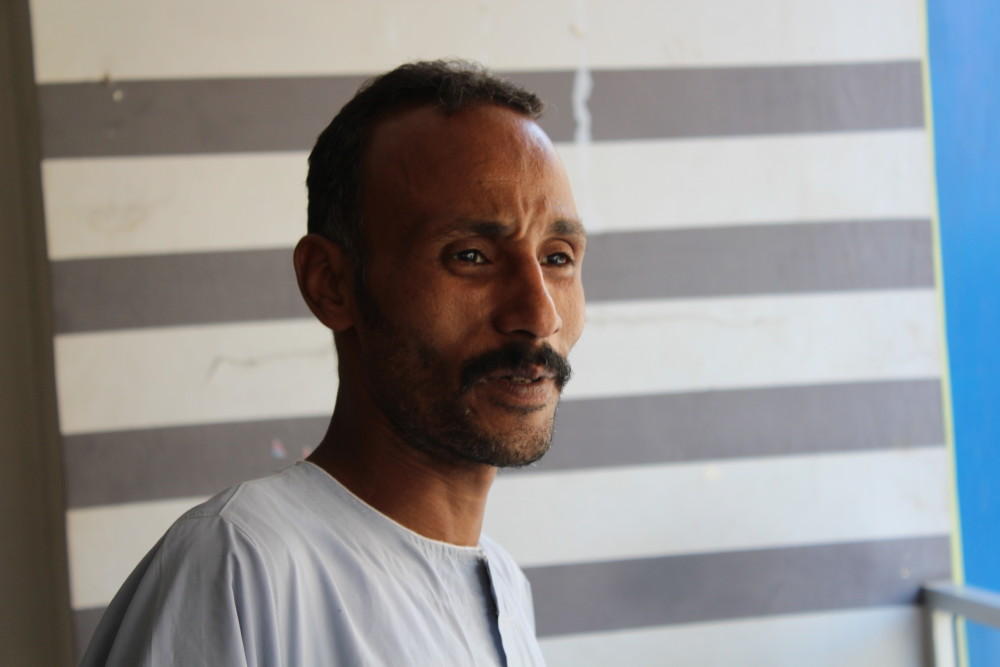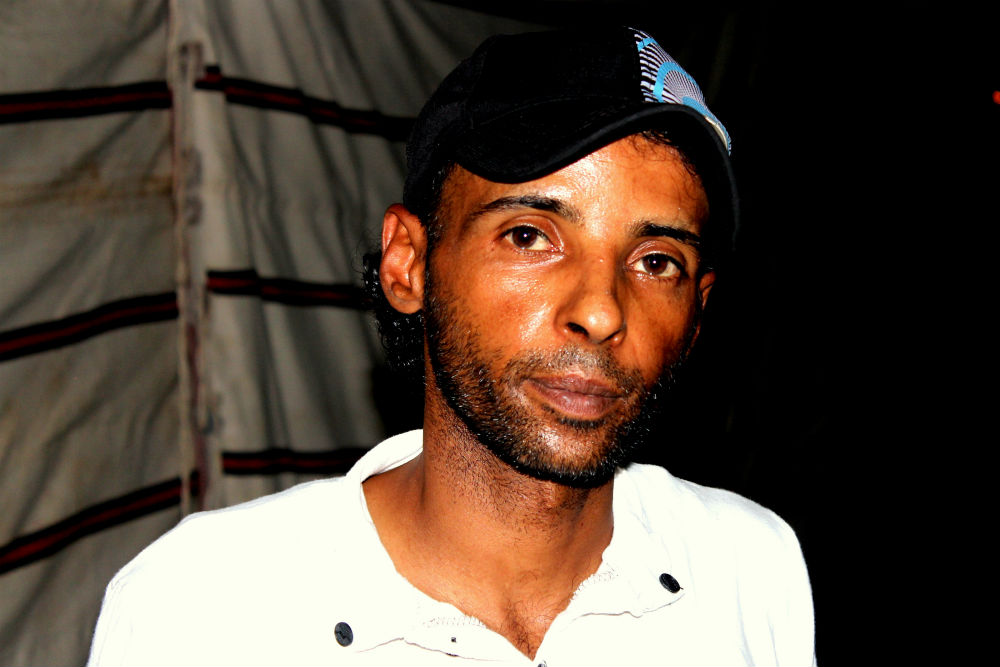By Avi Asher-Schapiro
As the polls closed on the final day of Egypt’s presidential poll, Ahmed Samir, the head of Field Marshal Abdl Fatah El Sisi’s presidential campaign in Luxor, paced the tiled floor of an upscale café. Sucking down a cigarette, he shouted into his phone: “There’s not much time. Get your people down [to the polls] right now.”
In Cairo, nearly 300 miles due north, crowds had gathered to celebrate the unsurprising victory of Field Marshal Sisi. But in Southern Egypt—known historically as Upper Egypt because of how the Nile enters Egypt through the region, flowing northward to the Mediterranean—Sisi’s victory was being overshadowed by the election’s dismal turnout. In Luxor, Egypt’s smallest governorate, barely more than 1/3 of eligible voters bothered to vote. With the polls closing in minutes, and with Sisi’s victory all but assured, Samir still radiated angst. Clearly insecure about the president elect’s weak mandate, Samir tried to deflect blame. “It’s hot out! And anyway, people here don’t really understand how important this election is,” he said.
As the final election results came in, Luxor governorate’s participation rate hovered around 37 percent, a full 10 percent below the national average even though electoral officials had extended voting for an additional day, called a national holiday, and private business owners had offered employees the day off to vote. Sisi dominated at the ballot box, carrying 96 percent of the vote. But apathy was the true winner: the vast majority of citizens opted out of the process altogether.
“Sisi is a military man like Mubarak—and we know how that goes…and of course I am sure he doesn’t care about our lives here in the South.”
With Samir at the helm, it’s easy to see why the Sisi campaign failed to inspire enthusiasm. Slight and fidgety, Samir played semi-professional soccer in Egypt’s Second Division league. He introduces himself as “captain,” and though he is Sisi’s man in Luxor, Samir doesn’t actually live here—he’s been sent from Cairo and seems to harbor little affection for the locals. “The people down here are simple and easily confused,” he says without any hint of self-awareness. Though eager to chat, Samir is unpolished and struggles to stick to campaign talking points. “I’d be happy if this is Egypt’s last presidential election,” he says. “I’m against term limits: why limit ourselves to four or eight years of Sisi. He’s what we’ve all been waiting for!”
This messianic reverence for the soon-to-be president has been dubbed “the cult of Sisi.” Just three years after Egyptians massed to remove Hosni Mubarak from power, Sisi, a U.S.-trained former head of military intelligence, now dominates Egyptian political life. Last summer, the Field Marshal took advantage of massive public protests against the Muslim Brotherhood to depose President Mohammad Morsi and appoint a military-backed government. At first Sisi denied his political ambitions, but in late March, he resigned as secretary of defense and launched a presidential bid. The campaign had a distinctly paternal flavor: with the help of a pliant national media, Sisi cast himself as a hyper-masculine national savior. In 2012, Sisi defended military sanctioned sexual assaults (mandatory “virginity-tests”) of female protesters that occurred in Tahrir Square. Today, the bug-eyed general is widely considered a heartthrob.
In Upper Egypt, though, the “cult of Sisi” is tempered with cynicism. Hassan, a long-out-of-work tour guide who declined to give a last name, voted for Sisi but doesn’t buy into his cult of personality. Unable to find steady work for three months, Hassan is desperate. “The most I can hope for is that Sisi’s victory will send a message abroad: come back, it’s safe,” he says. Hassan does not want be mistaken for a genuine Sisi supporter: “Look, I’m not stupid,” he says. “Sisi is a military man like Mubarak—and we know how that goes…and of course I am sure he doesn’t care about our lives here in the South.”
In the end, Hassan voted with his wallet. In Luxor, where Hassan lives, business has deteriorated—as of last March, the number of tourists had dropped by 1/3 compared to last year. As a result, many in the tourism industry support Sisi, betting that he can deliver stability, and ultimately, more western tourists. This reasoning is common in Luxor, home to the Valley of the Kings and Karnak, two of Egypt’s most alluring tourist destinations.
“The Sisi campaign is all about security—but we need more than that: we need health care, water, and electricity.”
Outside of Luxor people live in small villages, they work the land, and apathy reigns. In a cluster of villages known as Armant, just 13 miles south of Luxor, impoverished subsistence farmers are too busy outrunning starvation to worry about faraway national politics. In the small village of Abu Qlay’I, I saw a lone Sisi poster hanging on a half-constructed roof—pealing sun-bleached images of ousted Muslim Brotherhood leader Mohammad Morsi were much more common. When asked about the election, a group of middle-aged men flashed ten fingers, none stained by the dark ink that prevents voters from casting more than one ballot. They laughed as if to say, “couldn’t be bothered.”
Some men in Armant even said they voted for Morsi in last year’s election—an admission rarely heard in Cairo where Muslim Brotherhood supporters were massacred last summer. For decades, Muslim Brotherhood charities offered much needed public services in rural areas long-neglected by the central government. So while the group is now an official enemy of the state, here in Armant there is little trace of the vehement anti-Brotherhood sentiment that grips Egypt’s cities. There are also many Sisi supporters in the region, of course. But while Sisi voters in Cairo often tout the field marshal’s “secret plan” to improve the economy and upgrade infrastructure, Sisi voters in the villages tend to sound much more like Hassan: resigned, tired, and bracing for more bad news.
Here in Armant, villagers have endured decades of government neglect and there’s little hope that Sisi can turn things around. For over ten years local leaders in Abu Qlay’I, a 5,000 person farming community, have petitioned the government to extend water lines and electricity to the outer edges of the village. Now, over half the residents live without running water and electricity. Mohamad Fati Abu Said, a 52-year-old father of three, points to a newly built military base just a few miles away from his house. “Of course they were given lights and water immediately,” he says. A few years back, the government promised to extend electricity to Abu Said’s section of the village, so he dug a well in his backyard and purchased an electronic motor to pump water. But the electricity never came and he’s 15000LE (about $2,000) in the hole. Even the town’s subsidized bread dispensary—a necessary bulwark against starvation for many rural Egyptians—has been shuttered since 2003. And despite repeated pleas to Ali Gazar, the retired army colonel who serves as mayor, nothing has been done about the electricity, water, or lack of bread.
In the face of all this, pessimism runs deep: “Literally nothing has changed here since the revolution in 2011,” says Mustapha Zeki Ghassan, an elementary school teacher who has been organizing a village-wide push for water, electricity, and bread. A reluctant Sisi voter, Ghassan speaks with remarkable candor: “The Sisi campaign is all about security—but we need more than that: we need health care, water, and electricity,” he said. When asked if Sisi could deliver those things he smiled, and shook his head slowly. “We villagers have a very soft voice…but God willing,” he said before trailing off.
For the past few months, Nura Fahmy (not her real name), a 22-year-old investigator with the NGO Southern Center for Rights, has documented Abu Qlay’I’s never-ending push for public services. In May, she appeared on local TV to present her report on government neglect. Ali Gazar, the city’s mayor and a former army colonel, phoned the television station mid-broadcast, dressed-down Fahmy, and accused her of lying. Like the majority of Luxor residents, Fahmy did not vote in the presidential election—her confrontation with Ali Gazar intensified her aversion to military men in politics. Instead she boycotted to send a message that Sisi’s candidacy itself is illegitimate: “I hate Sisi,” she says bluntly. Military men like Sisi and Gazar are ill-equipped, she argues, to listen and respond to concerns of ordinary Egyptians, like the villagers of Abu Qlay’I.
But if opinion polls are to be believed, the cult of Sisi is shallow and fragile—his supporters are but a loud, vocal, and intimidating minority.
Distrust of Egypt’s central instructions, while rare in Egypt’s major cities, has a long history in Upper Egypt. Zeinab Abul-Magd, a professor at Oberlin and native of nearby Qena province, documented this restive history in her recent book Imagined Empires: A History of Revolt in Egypt. Until the mid 18th century, Luxor was part of the quasi-independent Qena province. Ruled by the fiercely independent Hawwara clan, Upper Egyptians resisted first Mamluk and then Ottoman hegemony. Even when the region was brought under full Ottoman control in the late 18th century, it retained an independent (and often subordinate) status. “Egypt’s passage to modernity…terminated the independent state in Upper Egypt, peripheralized the south within the Egyptian centralized government and economy, and relegated it to utter marginalization,” Abul-Magd writes. More recently, economic initiatives originating in Cairo squeezed Upper Egypt’s already poor and rural population. Beginning in the 1990s, Hosni Mubarak’s agricultural and industrial privatization schemes devastated peasant landholdings and depressed industrial wages. In the months leading up to the 2011 revolution, Upper Egypt saw a wave of strikes and labor actions, which helped instigate the nation-wide insurrection that toppled the Mubarak regime.
To this day, Southern Egypt suffers from Egypt’s over-centralized system of government: the president appoints governors who in turn appoint local mayors. In Upper Egypt, governors and mayors are most often ex-military officers. These unaccountable appointees are not accustomed to fielding complaints from subordinates, and often distribute patronage to political allies. The last Mubarak-appointed governor of Luxor Samir Farag, is a retired military general and was one of the first members of the Mubarak regime to face corruption charges. Farag sold public land in Luxor at below market prices to regime-connected investors, then spun the deal as a smart give-away to boost Luxor’s tourism industry. (Farag’s case was transferred to a military court and disappeared. He is now rumored to be one of Sisi’s top campaign advisors).
The current governor, Tarek Saaed El-Din is another ex-general and many citizens of Luxor I spoke to barely knew his name. But Mohammad Abdul Hak, a former employee of the al-Tur Gas Factory in Luxor, is quite familiar with Saeed El-Din. Until last month, Abbdul Hak helped lead a workers strike to demand a modest wage increase, and when Hak’s manager transferred him to a faraway factory as retribution, he appealed to El Din’s office to intervene. But El Din’s secretary rebuffed Hak and sided with the factory’s owner—a faceless investor from Cairo. Hak’s experience with El-Din’s office turned him into an election boycotter; he even convinced his entire family to stay home on Election Day. “I want a civilian president—no more military officers” he says.
Hak is missing teeth and struggles to read and write. But he’s well spoken, and a skilled organizer. He’s working to form a union at the al-Tur with the help of Luxor’s socialist Bread and Freedom Party. In the end, he plans to re-nationalize his factory, which was privatized by the Mubarak regime. Then, he and his colleagues can qualify for Egypt’s 1400L (200 dollar) a month minimum wage—which only applies to public sector workers. But he doesn’t think any of this will be possible in Sisi’s Egypt. “For now we keep trying,” he says. “I’m a patient man.”
Last Sunday, Sisi took the oath of office amid street celebrations and media fanfare. Viewed from Cairo, Sisi seems poised to dominate Egyptian politics for the foreseeable future. On the surface, there is little standing in his way: The Muslim Brotherhood is banned, many of its members in jail; secular opposition groups are marginalized and on the defensive. The Sisi campaign posters that currently blanket Cairo will likely be repurposed as pro-regime propaganda. But if opinion polls are to be believed, the cult of Sisi is shallow and fragile—his supporters are but a loud, vocal, and intimidating minority. Given time, the cult of Sisi can be felled and Upper Egyptian-style skepticism may catch on nationwide.
Avi Asher-Schapiro is a graduate student at NYU and a freelance journalist based in Brooklyn. He was a 2011-2012 Fulbright Fellow in Cairo, Egypt and his work has appeared in Salon, Vice, and Jacobin, among others.
